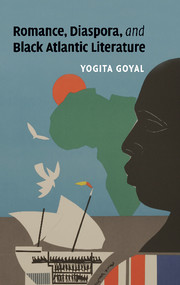Book contents
- Frontmatter
- Contents
- Acknowledgements
- Introduction: the romance of diaspora
- 1 From domestic allegory to imperial romance: Pauline Hopkins and racial mixture
- 2 From double consciousness to diaspora: W. E. B. Du Bois and black internationalism
- 3 From nativism to nationalism: Joseph Casely Hayford, Chinua Achebe, and colonial modernity
- 4 From romance to realism: Richard Wright and nation time
- 5 From revolution to arrested decolonization: Ama Ata Aidoo and the long view of history
- 6 From return to redemption: Caryl Phillips and postcolonial hybridity
- Notes
- Index
3 - From nativism to nationalism: Joseph Casely Hayford, Chinua Achebe, and colonial modernity
Published online by Cambridge University Press: 04 August 2010
- Frontmatter
- Contents
- Acknowledgements
- Introduction: the romance of diaspora
- 1 From domestic allegory to imperial romance: Pauline Hopkins and racial mixture
- 2 From double consciousness to diaspora: W. E. B. Du Bois and black internationalism
- 3 From nativism to nationalism: Joseph Casely Hayford, Chinua Achebe, and colonial modernity
- 4 From romance to realism: Richard Wright and nation time
- 5 From revolution to arrested decolonization: Ama Ata Aidoo and the long view of history
- 6 From return to redemption: Caryl Phillips and postcolonial hybridity
- Notes
- Index
Summary
The African in America is in a worse plight than the Hebrew in Egypt. The one preserved his language, his manners and customs, his religion and household gods; the other has committed national suicide.
Joseph Casely HayfordJoseph Ephraim Casely Hayford's Ethiopia Unbound: Studies in Race Emancipation (1911) begins expansively, with an epigraph addressed to “the sons of Ethiopia the world wide over,” employing the term “Ethiopian” as a synonym for all African-descended peoples. The novel presents the life of its protagonist, Kwamankra, a thinly veiled alter-ego of the author, as an allegory for the hoped-for nation of Ghana, prophesying the rise of a glorious African civilization. But this pan-African project quickly turns into a vicious attack on black writers from the diaspora, as Hayford argues that “the African in America” is deracinated, culturally adrift, and prone to a crippling self-doubt. Singling out W. E. B. Du Bois for particular censure, Hayford challenges his paradigm of double consciousness, offering his own prescriptions for the emancipation of the race as an authentic alternative. Though he admits the value of The Souls of Black Folk to the cause of black uplift, he takes issue with its central formulation of a divided self, claiming that Du Bois's revelation of the psychic trauma of post-slavery populations has no meaning for colonized Africans. Indeed, he paints both Du Bois and his rival, Booker T. Washington, with the same brush, calling them “provincial” and “exclusive” in their prescriptions for the race, insensitive to the specificity of colonial rule in Africa (163).
- Type
- Chapter
- Information
- Romance, Diaspora, and Black Atlantic Literature , pp. 104 - 141Publisher: Cambridge University PressPrint publication year: 2010



